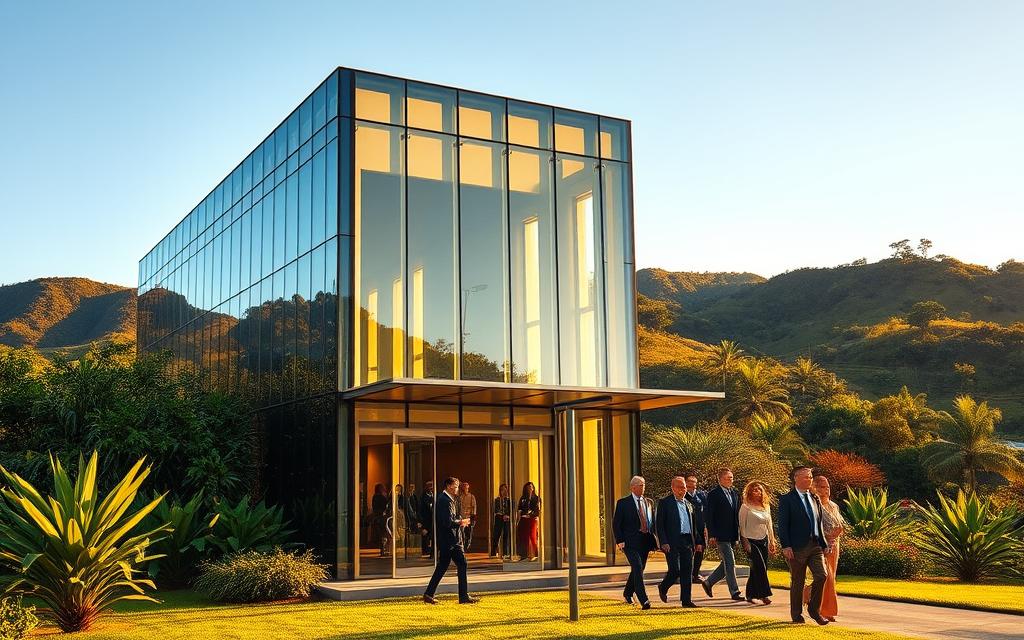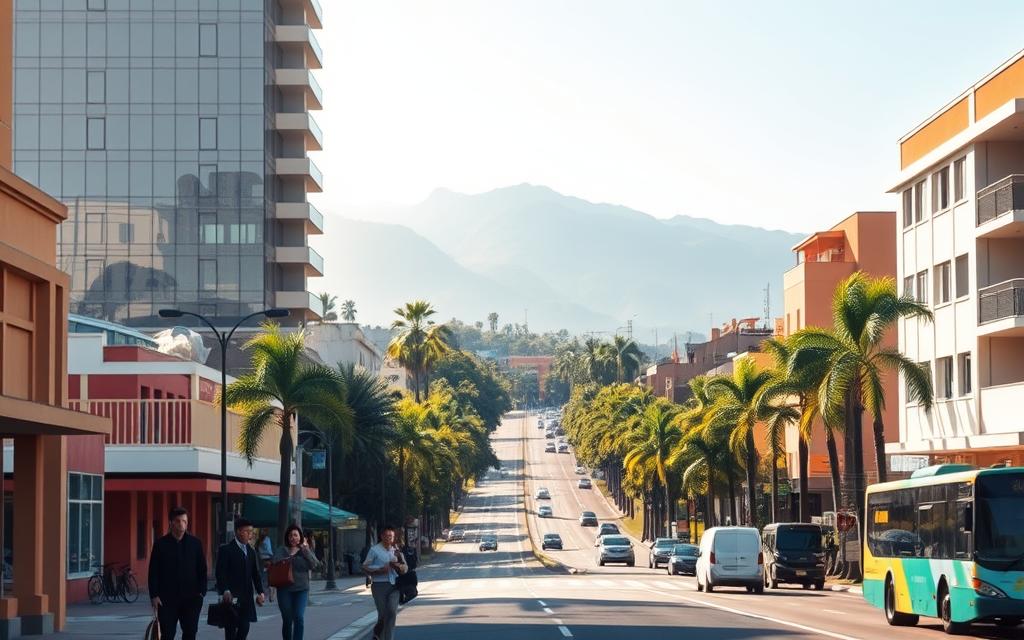How to Build Credit as a Foreign Resident in Costa Rica

Residency in Costa Rica has become an attractive option for individuals and families seeking a better quality of life. Known for its natural beauty and rich culture, this Central American country is a desirable destination for those looking to settle permanently or temporarily.
For expats, understanding the local banking and financing system is crucial. Seeking expert help can make the transition smoother, providing insights into financial services in Costa Rica. Establishing credit is a vital step towards a great experience in the country, enabling access to property ownership and long-term financial stability.
We will explore the process of building credit in Costa Rica, addressing the unique challenges and opportunities in this growing expat destination.
Understanding the Costa Rican Banking System

Navigating the banking landscape in Costa Rica can be challenging, but knowing the options is key. The country's banking system is a blend of state-owned and private institutions, each offering unique benefits and services tailored to the needs of foreign residents.
Regulatory Framework and International Standards
The Costa Rican banking system operates under a robust regulatory framework that adheres to international standards. This ensures stability and security for both local and foreign account holders. State-owned banks, such as Banco Nacional and Banco de Costa Rica, are popular among expats due to their wide range of services and secure nature. Their extensive branch networks across Costa Rica make traditional banking convenient.
State-Owned vs. Private Banks
When choosing a bank in Costa Rica, foreign residents must decide between state-owned and private banks. State-owned banks offer greater stability and government backing, but may have stricter requirements for establishing credit. Private banks, including Scotiabank and BAC Credomatic, provide personalized services and often have English-speaking staff, making them an attractive option for expats despite potentially higher fees.
Understanding the differences in interest rates, mortgage options, and financing opportunities between these bank types is crucial. State banks offer extensive branch networks and stability, while private banks may provide more flexible services tailored to expat needs. By comparing these aspects, foreign residents can make informed decisions about where to build their credit history in Costa Rica.
Residency Status and Its Impact on Banking

In Costa Rica, the type of residency you hold significantly influences your banking options and financial capabilities. The country's banking system is designed to accommodate both locals and foreigners, but the level of access to various banking services largely depends on your residency status.
Options for Non-Residents
Non-residents face certain limitations when it comes to banking in Costa Rica. Some banks are more accommodating than others, but generally, proof of residency is required for most banking services. For instance, banks like Banco Nacional and Banco Popular have stricter rules and require proof of residency to open an account. For those looking into bank accounts for foreigners in Costa Rica, this can be a significant hurdle. However, some banks offer limited services to non-residents, and there are alternative financial solutions available, which we will explore later.
For more information on residency requirements and how they impact your stay outside of Costa Rica, you can visit this resource to understand the specifics of residency rules.
Benefits of Obtaining Legal Residency
Obtaining legal residency in Costa Rica dramatically improves your banking options and credit-building potential. Costa Rica offers several residency pathways, including rentista for those with stable income, investor for business investors, and permanent residency options. Each of these pathways affects your financial capabilities differently. Legal residents enjoy expanded access to banking services, including higher transaction limits, more account options, and greater eligibility for loans and mortgage financing.
The process of obtaining residency, while requiring time and documentation, provides significant financial benefits that make credit building substantially easier. Different residency categories, such as temporary versus permanent residency, impact your banking rights and credit-building potential in Costa Rica. For those serious about establishing long-term financial stability, pursuing legal residency is a priority step in your credit-building strategy.
Opening Your First Bank Account

For foreigners, opening a bank account in Costa Rica is an essential part of integrating into the local financial system. We will guide you through the process, ensuring a smooth transition into the Costa Rican banking environment.
Required Documentation
To open a bank account, you'll need to provide specific documents. Typically, these include a valid passport, proof of residency, and sometimes a reference letter from your current bank. Ensuring you have all the necessary paperwork will streamline the application process.
Best Banks for Foreign Residents
Banks like Banco de Costa Rica are open to non-residents and offer a range of services. When choosing a bank, consider factors such as fees, online banking capabilities, and customer service. You can visit the Costa Rica financial services page for more information on banking options.
Step-by-Step Application Process
The application process typically involves visiting the bank in person, filling out the required forms (often in Spanish), and presenting your documentation. After submitting your application, the bank will review it, and you'll be notified once it's approved. This process can take between 3 to 10 business days.
Understanding the timeline and what's required helps set realistic expectations and allows you to plan your financial transition to Costa Rica more effectively. We'll walk you through the complete application process, from initial research to receiving your account access credentials.
How to Build Credit as a Foreign Resident in Costa Rica

Building credit in Costa Rica as a foreign resident requires a strategic approach to financial management. When picking a bank, expats should consider several factors, including branch availability, services provided, fees, and support for foreign nationals. These considerations lay the groundwork for establishing a strong financial presence in Costa Rica.
Establishing Banking History
Establishing a banking history is the first step towards building credit. This involves opening a local bank account and managing it effectively. Regular deposits from verifiable income sources provide banks with evidence of your financial reliability and capacity to repay credit obligations. For more information on transitioning to residency in Costa Rica, you can visit this resource.
Starting with Secured Credit Options
Starting with secured credit options is a practical way to begin building credit. Secured credit cards or loans require collateral, reducing the risk for lenders and making it easier for foreign residents to obtain credit. By managing these credit options responsibly, you can demonstrate your creditworthiness to Costa Rican lenders.
Demonstrating Financial Stability
Demonstrating financial stability is crucial for strengthening your credit profile in Costa Rica. This involves maintaining healthy account balances, avoiding frequent overdrafts, and documenting stable income. Strategic financial planning, including establishing emergency funds in local accounts, demonstrates long-term financial responsibility. By showing consistent banking patterns and financial discipline, you can improve your credit standing.
Alternative Financing Options for Non-Residents

While local bank loans may not be feasible for all foreign residents, there are other financing avenues to explore in Costa Rica. Alternative financing options can provide the necessary funds for property purchases or real estate investments.
Seller Financing for Property Purchases
Seller financing is an attractive option for foreign buyers, as it allows them to negotiate directly with the seller. This method can be particularly beneficial for those who may not qualify for traditional bank loans.
Private Loans and Hard Money Lenders
Private lenders and hard money lenders offer another financing route. These lenders often have more flexible criteria than traditional banks, though they typically charge higher interest rates.
International Financing Solutions
International financing solutions cater specifically to foreign buyers. Some international banks operating in Costa Rica offer mortgage products that recognize foreign credit histories. Offshore lenders also provide financing options with flexible approval criteria, albeit at higher interest rates ranging from 9 to 12 percent.
These international financing options allow transactions in major currencies like the US dollar or euro, reducing exchange rate risks for foreign buyers. However, it's crucial to consider the cross-border legal implications and potential currency fluctuation risks.
For substantial real estate investments, international financing may provide access to larger loan amounts than local financing channels. This makes it an attractive option for foreign investors looking to make significant property purchases in Costa Rica.
Building Business Credit in Costa Rica

When moving to Costa Rica, entrepreneurs must navigate the local financial landscape to build business credit. Establishing a strong credit profile is crucial for securing financing and achieving long-term success in this growing economy.
Registering a Legal Business Entity
To start building business credit in Costa Rica, it's essential to register a legal business entity. This process involves choosing the right business structure, obtaining necessary licenses, and registering with the relevant authorities. By formalizing your business, you create a foundation for establishing credit.
Business Banking Relationships
Developing a strong relationship with a local bank is vital for building business credit. This involves opening a business bank account, obtaining a credit card or line of credit, and making timely payments. By demonstrating financial responsibility, you can establish a positive credit history.
Vendor Credit and Trade Lines
Establishing vendor credit and trade lines is another effective way to build business credit in Costa Rica. By working with suppliers who report payment history to credit bureaus, you can create a documented evidence of your business's creditworthiness. Starting with small credit lines and consistently paying on time helps establish positive payment patterns, strengthening your business credit profile.
By following these steps and maintaining a strategic approach to credit management, businesses can establish a strong credit foundation in Costa Rica, enabling them to access better financing options and achieve their growth objectives.
Common Challenges and How to Overcome Them

Foreign residents in Costa Rica often struggle to build credit due to several common challenges that can be mitigated with the right approach. As expats make Costa Rica their home, they face unique obstacles in establishing a financial foothold.
One of the primary difficulties is the language barrier. Many Costa Rican banks have limited English-speaking staff, making it challenging for expats to navigate the banking system.
Language Barriers
To overcome this, expats can take language classes or work with a local representative who can facilitate communication with bank officials. Some banks in Costa Rica, particularly those in tourist areas, have begun to cater more to expats by offering English-speaking services.
Documentation Issues
Another challenge is meeting the documentation requirements for opening a bank account or securing credit. Costa Rican banks often require specific documents, such as proof of residency, income, and identification.
To address this, expats should ensure they have all necessary documents in order and be prepared to provide additional information as required by the bank.
Building Trust with Local Institutions
Costa Rican banks are naturally cautious when dealing with foreign residents due to perceived flight risk. To build trust, expats can establish a long-term presence through consistent banking activity, community involvement, and local investment.
Regular in-person visits to the bank branch and developing relationships with specific bank officers can significantly improve credibility. Understanding and respecting local banking culture and practices also demonstrates cultural sensitivity, positively influencing how financial institutions perceive expats.
By understanding these challenges and taking proactive steps to address them, expats in Costa Rica can successfully build credit and make the most of the country's financial opportunities.
Conclusion
As we conclude our comprehensive guide on building credit in Costa Rica, it's clear that the journey requires patience and strategic financial planning. We've explored the comprehensive journey of building credit as a foreign resident, from understanding the Costa Rican banking system to overcoming common challenges.
Building credit in Costa Rica requires time, with most foreign residents needing 1-2 years of consistent financial activity before accessing significant credit opportunities. The path to credit building differs based on your goals: financing a home purchase may lead you toward seller financing or international options, while business credit requires establishing formal business structures.
For those seeking to purchase property, understanding mortgage options and real estate financing alternatives is essential. Establishing a bank account serves as the foundation for all credit-building activities in Costa Rica. While challenges exist, thousands of expats have successfully built credit by following strategic approaches.
For personalized assistance with residency applications that can improve your banking and credit options, contact JAROS CR at www.jaroscr.com, info@jaroscr.com, or +(506)7182-8969. With proper planning and realistic expectations, foreign residents can establish credit in Costa Rica and enjoy financial flexibility.
Building credit in Costa Rica is about creating a stable financial foundation for your new life. By understanding the local banking system, exploring financing options, and taking strategic steps, you can achieve your financial goals in this beautiful country.


